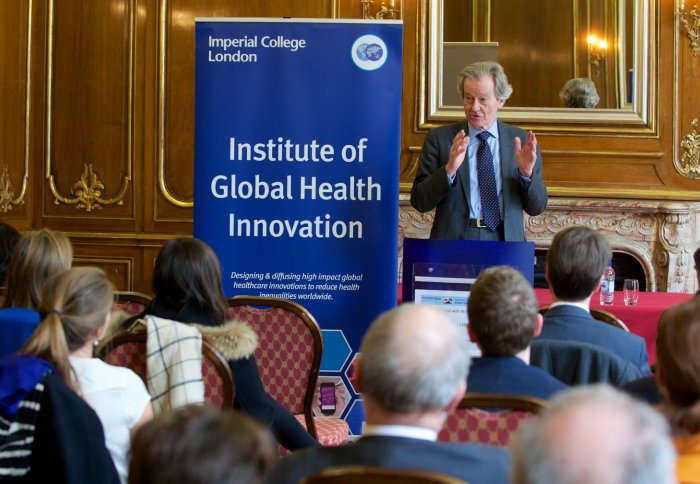
Rt Hon Stephen Dorrell on the future of commissioning within the NHS.

IGHI host policy seminar on challenges facing NHS Clinical Commissioning Groups (CCGs) and how best to overcome them.
On 3rd February in South Kensington, Former health minister and current IGHI Visiting Professor, Rt Hon Stephen Dorrell spoke at a policy seminar which was attended by a number of high profile Imperial academics and clinicians. The seminar's focus was on the current challenges for commissioning within the NHS and offered five key suggestions on the way forward for CCGs.
What does NHS commissioning mean?
In a nutshell, commissioning is the process of planning, agreeing and monitoring services within the NHS. It is not one action, but many, ranging from assessing the health needs of a population through the clinically based design of patient pathways, service specification, contract negotiation and service procurement with regular assessment on the quality of services delivered.
Over the past decade, the role of commissioning as a key driver of quality, efficiency and patient outcomes has become increasingly important to health systems in England.
How has it changed?
Clinical Commissioning Groups (CCGs) were created following the Health and Social Care Act in 2012. They are clinically-led statutory NHS bodies responsible for the planning and commissioning of health care services for their local area. The commissioning system was previously made up of primary care trusts and specialised commissioning groups. However, most of the NHS commissioning budget is instead now managed by these 209 CCGs.
Breaking the silos
 During the seminar, Stephen addressed how we can better work with CCGs and how through multidisciplinary working can we break the current silos and create a more joined up NHS which focuses on solutions and the needs of the patient. He suggested that the function of commissioning ought to focus not on the institution but on the needs of the communities we are trying to serve and to solve problems rather than seeking to manage the healthcare provider.
During the seminar, Stephen addressed how we can better work with CCGs and how through multidisciplinary working can we break the current silos and create a more joined up NHS which focuses on solutions and the needs of the patient. He suggested that the function of commissioning ought to focus not on the institution but on the needs of the communities we are trying to serve and to solve problems rather than seeking to manage the healthcare provider.
Good management, in his opinion, is about pushing responsibility down the line rather than taking a top down approach. He commented that every time the centre or higher management intervenes or prevents local teams from doing what works for them, the next time they face a difficult decision, they will simply refer it up the line and not learn from their mistakes.
However, there are also a number of challenges from taking this approach. One of the main gaps commissioning is currently looking to fill was the issue in empowering localised management whilst making them accountable for their actions. In order for the system to work, it was crucial that we create a well thought out accountability structure.
Stephen listed three challenges which urgently needed addressing:
- Working on providing strong evidence that commissioning actually works.
- Creating open minds amongst commissioners about competition between service providers.
- Obtaining viable evidence that competition within a healthcare setting actually helps and not hinders.
In summing up his recommendations for the future, Stephen thought that although we had not delivered the system change we had hoped through commissioning, the key was to work on improving the current commissioning model instead of reverting back to a central planning structure.
He went on to list five characteristics to look for in a new commissioning approach:
- Invest in health rather than illness and target resources to help support healthy living and avoiding unnecessary illness rather than waiting for the acute case to arise.
- Focus on the needs of the individual citizen and encourage patients to take control of their own health and preventative care, which in turn should deter them from becoming dependent on healthcare providers.
- Creating a rational set of incentives.
- Join up and fuse together aspects of service relevant to people's lives. Services need to talk to each other so they are fully informed to make the best decisions.
- Be responsible for the delivery of public services which do not reinforce the silos.
Commissioning done well helps reshape our health and care system to meet the challenges that our society faces today. Budgets should not be confined to the silos within the NHS, but should be used to invest in health as a whole
– Rt Hon Stephen Dorrell
In concluding his talk, Stephen said that “Commissioning done well helps reshape our health and care system to meet the challenges that our society faces today. Budgets should not be confined to the silos within the NHS, but should be used to invest in health as a whole by working in a multidisciplinary fashion and with the local community in order to solve relevant problems.
The NHS should be a part of a mix of public services which delivers the objectives of social policy within a community. It should be embedded within public services, not a city on a hill set apart”.
All of the photos from the event can be viewed here.

IGHI Director Prof Ara Darzi with Stephen Dorrell
Article text (excluding photos or graphics) available under an Attribution-NonCommercial-ShareAlike Creative Commons license.
Photos and graphics subject to third party copyright used with permission or © Imperial College London.
Reporter

Jo Seed
Institute of Global Health Innovation

Contact details
Email: press.office@imperial.ac.uk
Show all stories by this author



